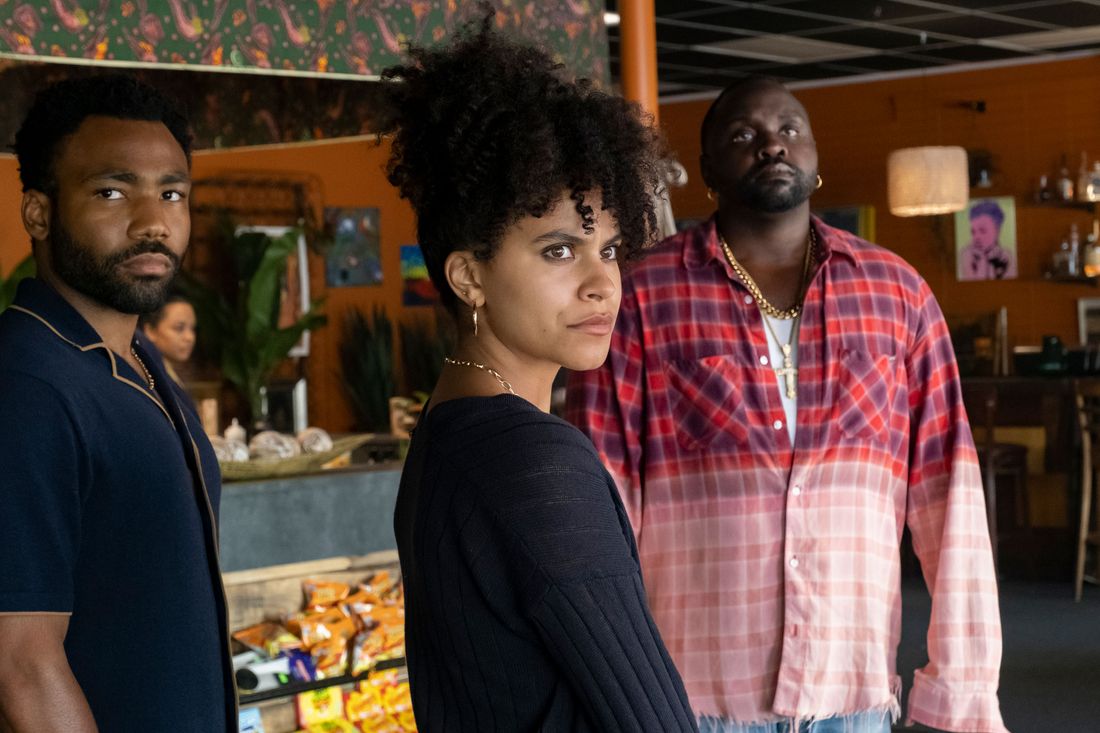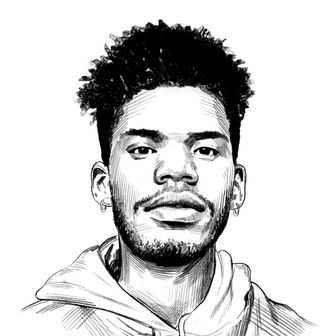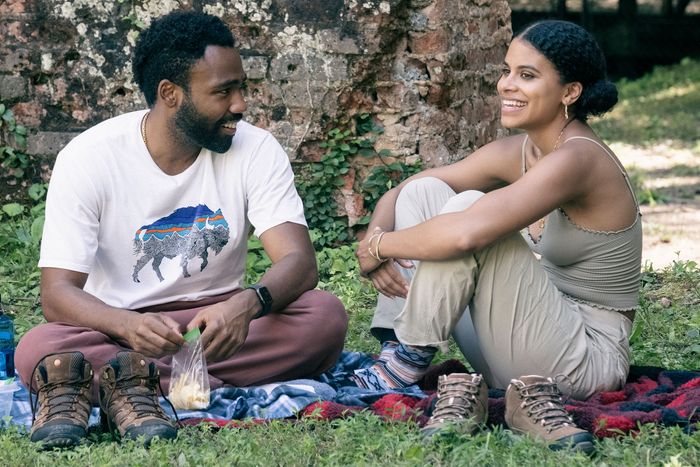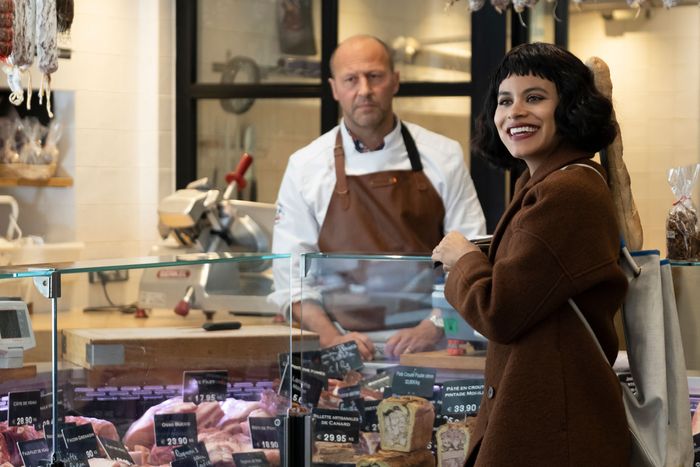
This article originally appeared in Dinner Party, an evening newsletter about everything that just happened. Sign up here to get it every weeknight.
Last week, FX’s Atlanta ended its bombastic run with a muted tenderness that rarely surfaced over the course of four seasons. Brainchild of brothers Donald and Stephen Glover and director Hiro Murai, Atlanta has, for the last six years, endeared viewers to the bizarre precarity of its titular city, its racially classed contours contextualizing the kooky, compelling characters at the show’s heart. Those characters are now seared into television history: We will always remember Paper Boi (Brian Tyree-Henry) sweating in the woods while grieving his mother; Glover shrugging off Earn to transmogrify into Teddy Perkins; Darius (Lakeith Stanfield) philosophizing about the nature of existence (or, like, weed or something); and Zazie Beetz’s Van delivering baguette beatdowns in Paris.
That Paris episode, season-three finale “Tarrare,” was probably one of the show’s simplest, plot-wise, if also one of its more controversial: Beetz gallivants around France, shirking her responsibilities as a mother to her daughter with Earn in search of something nearing an authentic identity — one that isn’t tied to motherhood, a relationship with an emotionally unavailable man, or, really, any one script about how her life should play out. This episode, Beetz told me over Zoom earlier this week, was the culmination of a season-long character arc that got at the center of Van’s complexity. “I resonate so profoundly with this feeling of wanting to run away,” she says, peering off into a sunlit window from her New York home. “Van was this very broken version of that.”
And yet Atlanta’s final season opens with Van still facing her identity crisis. Stuck between roles ranging from unwieldy (Lottie’s mother) to unsuitable (Earn’s security blanket), critics and viewers alike questioned just what the hell was going on with her. Beetz identifies with this “classic 20s dilemma” of trying to understand where an outcast fits into the world — or whether one should even want to — and, indeed, after four seasons on a series that took pains to explore the insider-outsider dynamic as it relates to fame and relationships, Beetz grew to view her own disconnect as a strength. Even though Atlanta has now wrapped, Beetz’s past and future roles (movies Joker, Deadpool 2, and The Harder They Fall, as well as the forthcoming HBO miniseries Full Circle) prove she does, indeed, belong. And when she looks back on her time on Atlanta and the relationships forged there, a softness — that exhalation of relief felt in the show’s closing moments — returns.
In “Snipe Hunt,” Van, Earn, and their daughter Lottie go on a camping trip, where Earn shoots his shot to get back with Van. After a pretty vulnerable conversation, she reciprocates. Why do you think she does this?
When Donald and I would talk about their relationship, I got the sense that they were compatible but never really had the opportunity to explore that compatibility. They spent very little time dating, which is never explicitly said in the show, because they got pregnant very quickly. They never had the opportunity to explore each other without that.
Also, they both feel like they’re different. In my audition for Atlanta, I remember thinking, Damn, I’m not Atlanta enough. Feeling like I wasn’t representing the city or the vibe enough. I found out years later that that was the reason I was cast. Donald felt Earn was different, too, so he’d probably date somebody who also felt like an outcast. All these years I’ve been feeling like I’m not embodying this city in the way I need to be embodying it, but ultimately, that ended up being a kernel of why Van is the way Van is.
But they enjoy each other. They make each other laugh if there’s no conflict. And Earn has so much more stability than he used to have, which was a big issue for Van. He’s actually showing up verbally and physically in a way he didn’t in the past. Ultimately, he’s working on himself and Van is working on herself too. I don’t think their relationship is actively dysfunctional. It used to have more dysfunction than it does now, so why not try for that love trinity of child, partner, partner?
We’ve all grown as people doing the show. Donald has a family, and that did come into play. I want a family. As you get older, you realize the love element is stronger than pride.
During that convo, Van was like, “Damn, this kinda feels like manipulation” ’cause Earn buys out the whole campsite, which felt real as fuck. [Laughs.] Obviously, y’all have scripts, but how’d that conversation come together?
Van has her guard up the whole time, understandably so, and then she’s ultimately the one to be like, okay, let’s give it a go. Earn is the one who puts his guard down first, I guess.
The whole show is a map of our growth over the last seven years, but particularly Donald’s growth as a man, as a parent, as a son and a partner. In the beginning, there was a sense of nihilism to it all; I remember Donald saying during season one, “If the show gets canceled, whatever, who cares?” That is probably a mix of younger ego and not wanting to feel anything if it does get canceled, then also being like, I want to do something that is radical and different and new, so if it gets canceled, in some ways we made our point.
Years ago, he would say he would’ve never had Van and Earn be together because that would’ve been corny or expected. But we got older and it’s nice to have a family. There’s so many things we call cliché. Like, “Paris is romantic.” That’s a cliché. But Paris is romantic. It’s a cliché for a reason — ’cause it’s nice. And I think people want love. Especially now, there’s so much tension; to see love thrive is a gift and also, in some ways, the more vulnerable choice. To choose each other and to be hurt again is maybe the scarier and braver and more mature thing to do, as long as it’s not actively toxic. So it’s kind of punk rock to choose love.
Watching that episode, I was kinda like, Damn, how’d they get here? ’Cause y’all see each other in Amsterdam and then we don’t really see them together very much. But watching this show over multiple seasons, like, we know shit be happening in the background too, I guess?
Yeah, the storytelling is just not linear.
So how do you, as an artist, keep track of Van’s interior life?
Hiro, Donald, and I talked like, Okay, how much time has passed since Amsterdam? And then we fill the gaps from there. Like the camping trip in “Snipe Hunt”; I don’t think they’d been camping before, but it’s clear they’d been doing stuff together since Europe. We also talked about not needing to feel beholden to things that happened before, so that the relationship exists in its own space, too. Not feeling like I have to build a very clear arc. Though with season three, we talked a lot about making sure Van’s arc was clear. There was rewriting going on as we were shooting it, as we were discovering what her arc was turning into. And I know with “Tarrare,” which is the Paris episode, they were definitely trying to find that balance of what fits within her season arc, so it doesn’t come across as too off-the-charts.
Do you mourn her at all?
I’ve hung on to Van in a way I haven’t hung onto any other character. Not in a way that’s like, I don’t know when I’m Van or when I wasn’t. I haven’t done anything Method.
Okay, great, ’cause I’m really not tryna have that conversation [Laughs.]
I think about the last seven years of my life and it’s been so much around anxiety and identity and who I want to be versus who I am, and striving to be something I’m perhaps not. The classic 20s dilemma.
Particularly for season three, exploring Van’s vulnerability, I felt very connected. I resonate so profoundly with this feeling of wanting to run away. I’m kinda flaky and “go with the wind”; I don’t want to be tied down to anything and think of myself as a very independent individual. I don’t ever want that to be compromised by anything or anyone. It’s this feeling of I just wanna run to Thailand and nobody knows who I am and I’m just doing my thing. Van was this very broken version of that. I think of her as this ephemeral child I’ve been tasked to take care of. I have a necklace with her name on it. I just wanna feel close. The character is a part of my transformation in my life.
As a sorta disconnected wanderer, how’d it feel being nominated for the Emmy?
It’s funny you say that, ’cause that is actually how I felt. I mean no disrespect to any of the awards or anything, but it feels like that’s my other life, and then I have my real life. I was having my own insecurities and feeling like I don’t deserve this, which colors the whole experience. Awards stuff can feel very political too, so it makes me question, am I nominated for my talent or because of politics?
Yeah, you seem like you keep that stuff at a safe distance. Is it just like, Okay, that’s just the job?
This is actually breaking down a lot right now. Hollywood as an institution is a lot less mysterious than it used to be ’cause of social media and internet and blah, blah, blah. The real superstar is much harder to come across. Working and going to events and stuff like that, you have this very real feeling of people among people. Movie magic is movie magic and the reality of being on set is not glamorous, and the reality of awards stuff is also just people. It’s odd to be a part of something you’ve watched. Working red carpets is almost dissociative: a mix of awe and recognizing the humanity of it. I think a lot of people feel this way.
One of the big criticisms of the show is the creators’ handling of Black women. Is it weird for you, being the primary focus of those critiques?
I’m aware, but I also don’t really dive into a lot of comments. I generally don’t even watch the episodes as they’re happening. I’ve taken months before I’ve actually watched ’cause I do detach and I feel, in some ways, it’s not really mine anymore. Even positive or negative comments — somebody can tell you a million times you did great, but if you don’t believe it, then it doesn’t mean anything. Somebody can tell me that sucked, but if I disagree, I disagree. [Laughs.] A lot of people had mixed feelings about my Paris episode. People who didn’t understand the whole thing or people who really fucked with it. I really connected with that episode, so when people are like, I don’t know, I don’t get it, I’m like, Eh, well, you didn’t get it. That’s okay.
I think a lot of people just wanted to see more of Van, you know? Like to really understand her.
In some ways, I don’t know if I’m in the center of that conversation. It’s more a conversation with the creators of the show.
That’s absolutely fair.
In season three, Van was gifted quite a profound arc that I loved and felt very connected to. The show is told from the point of view of a Black man about his experience as a Black man. Alfred particularly embodies a lot of the anxieties Donald is experiencing. So I think the show is a reflection on the Black experience in America in Atlanta, but it’s ultimately a reflection of Donald’s experience as himself. Van is just an element of that. There are really interesting moments for her as a Black woman that she experiences in and outside of the context of Earn. I value those moments and I put my flavor in — my own interpretation and the conversations we have around them. But ultimately, this is Donald’s exploration of his psyche. And he is gonna write what he knows.
I read or watched an interview with you and Brian where y’all delineated between Atlanta the show and Atlanta the support group. How did y’all keep each other here?
We have a very active, very no-holds-barred group chat. We all experienced this big life shift in unison. That created a bond around navigating this new life, and it was a blessing. Brian and I would always be each other’s partners on carpets, holding hands together and being nervous. I have called Donald for advice on how to handle certain situations or if I was like, I’m thinking of this project, but I don’t know if it’s right. And with Keith talking about authenticity in the industry, we all just see each other. We know each other’s secrets.
While shooting the last season, did you get the sense that everyone was ready to hang it up?
I have so much fun on that set. I’m sad to leave that experience behind. We keep realizing the Atlanta set vibe was a special thing. I mean, I’ve heard of shows meeting group therapists because people are struggling. We didn’t have any kind of active animosity. It was a very comfortable, friendly, supportive set, and with each season it became more so. I miss that camaraderie. And with TV, you get to learn more and more so you can take more risks and it’s more fun to act. You’re like, I’m not gonna fire me. They can’t fire me now.
Yo, true, I bet that shit feels nice.
If it doesn’t work, it doesn’t work. That feels very different if you don’t have that familiarity and active security. Even now I’m on a project, like, All right, here it goes. It’s first day of school every time. It’s nice to go back to the first day of school, not first grade, but tenth grade and you’re all friends already. But we finished shooting a year ago, so we had a year to prepare. We were able to say our good-byes and relish in each other before the end.
This interview has been edited and condensed for clarity.





